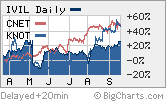 |
| Let's make a deal? Shares of niche online content companies iVillage, CNET and The Knot have soared in recent months. |
|
|
|
|
|
|
|
|
|
|
|
NEW YORK (CNN/Money) � Round and round the Internet merger wheel goes. Where it stops, nobody knows.
Frenetic is the best way to describe the pace of consolidation in the online sector during the past few months.
Media giant News Corp. (Research) has made three significant Web deals since July. Yahoo! (Research) acquired a significant stake in Chinese Net firm Alibaba.com last month. And eBay (Research) followed up its Shopping.com deal from June with last week's buyout of Internet phone service Skype.
All this activity has led to increased speculation about who's next to join the mating dance. There are only a handful of appetizing public Internet companies left. So not surprisingly, shares of several of them have surged lately.
Shares of tech news firm CNET Networks (Research) and online wedding planner The Knot (Research) have both shot up nearly 50 percent during the past six months while shares of iVillage (Research), which specializes in news for women, have gained more than 20 percent.
The price isn't right?
Most expect more deals in the coming months. But are takeover premiums already baked into these stocks? It's hard to say.
Frank Gristina, an Internet analyst with Avondale Partners, said CNET and iVillage could be attractive takeover targets for a larger media company because they each have improving profit margins. But he thinks both companies would command a hefty price because of this. In addition, the scarcity factor also could drive up their value.
"The question of price is interesting," Gristina said. "Is the timing right or did consolidators miss the opportunity to buy these companies?"
Still, Gristina said investors can't underestimate the chance that traditional media companies, lured by the strong growth potential of online advertising, could pony up high prices in order to scoop up some of the few remaining top Internet names.
"Traditional media companies are more desperate at this point," he said.
Allison Thacker, co-manager of the RS Internet Age and RS Information Age funds, also thinks that "older" media companies are going to keep buying online assets.
However, she warns that investors shouldn't buy an Internet company just because of takeover talk since prices for many of the targets are now quite rich.
"There is a sense of hysteria among media companies so I don't think we're nearly at the end of consolidation. But valuations already reflect that," Thacker said, adding that she does own CNET in the Internet Age fund because she likes the company's fundamentals and does not think the company needs to sell out.
Still, others think that takeover targets are too expensive just yet.
Chuck Richard, a vice president and lead analyst with Outsell, Inc., a research and advisory firm for the information industry, said that prices are still attractive.
"Valuations are rising. But have we entered a frothy period? Not yet," Richard said. He thinks that iVillage and Hollywood Media, which runs the Hollywood.com news site and Broadway.com theater ticket service could be a good fit for a company like IAC/InterActive (Research), the extremely acquisitive Internet firm run by Barry Diller. He added that private equity firms might also be interested in online media companies like CNET.
Bet on the arms dealers
But what about the two online giants, Yahoo! and Google (Research)? Some think these two will need to make more deals in the future to keep, especially if a rumored partnership or joint venture between Microsoft's (Research) MSN division and Time Warner's (Research) AOL unit come to fruition. (Time Warner also owns CNN/Money.)
Yahoo! has made several acquisitions in the past to increase its presence in online content. Google, in its short history as a public company, has done some small deals and there is increased speculation that the company will make a larger purchase following its secondary offering of stock last week, which raised more than $4 billion for the company.
Still, Thacker said that investors shouldn't expect Google, which she also owns in the Internet Age fund, to make a play for one of the independent online media companies.
"Google is first and foremost a technically driven, engineering culture," she said. "It would be startling to see them make a content acquisition especially since they keep saying they are not a portal," Thacker said.
But Google might be interested in marketing services companies, firms that have technology which help Web site publishers get listed on search engines. She owns two such firms, Marchex (Research) and ValueClick (Research) in both the Internet Age and Information Age funds and owns two others, Aptimus (Research) and aQuantive (Research), in the Internet Age fund.
And with more and more content getting published on blogs and other sites not run by mainstream media outlets, Thacker said that these types of firms are better bets than niche Internet media plays, even if they don't get bought out.
"It's the whole arms dealer argument. Invest in companies that allow the content guys to be in business," she said. "These are ways to invest in the broader thesis of the rising use of online media."
For a look at more Internet stocks, click here.
Why does eBay like Skype? Click here to find out.
Analysts quoted in this story do not own shares of the companies mentioned and their firms have no investment banking relationships with the companies.
The reporter of this story owns shares of Time Warner through his company's 401(k) plan.
Sign up to receive the Tech Biz column by e-mail.
Plus, see more tech commentary and get the latest tech news.

|